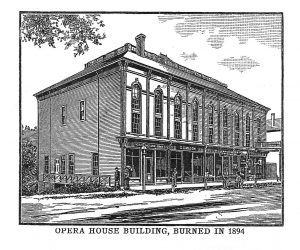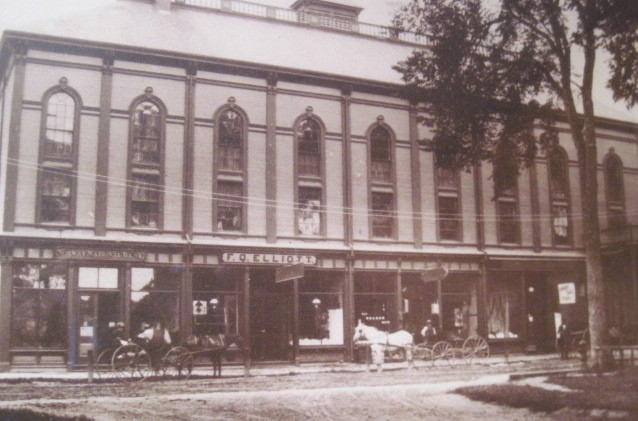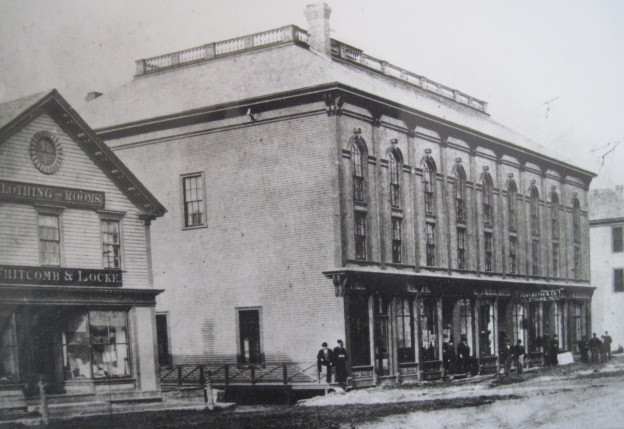The Wooden Opera House
 The section of Main Street around the area now occupied by the opera house suffered a devastating fire on April 21, 1882. The following articles recount the businesses and buildings lost in that fire and describe the construction of the large wooden Norway Hall that was built in place of a number of smaller buildings. Ultimately, Norway Hall was lost in the Great Fire of 1894, and the current brick opera house was built on the same spot.
The section of Main Street around the area now occupied by the opera house suffered a devastating fire on April 21, 1882. The following articles recount the businesses and buildings lost in that fire and describe the construction of the large wooden Norway Hall that was built in place of a number of smaller buildings. Ultimately, Norway Hall was lost in the Great Fire of 1894, and the current brick opera house was built on the same spot.
The Norway Advertiser office burned in this fire, so some of these newspaper accounts are from the Oxford Democrat (of Paris Hill).
FIRE AT NORWAY MONDAY MORNING-MASON BROS. BIG HARDWARE STORE, CROCKETT’S DRUG STORE, CUMMING’S MILLS, COLE’S CARDING MILL, AND SEVERAL OTHER BUILDINGS TOTALLY DESTROYED— LOSS IN THE VICINITY OF $20,000— COMPARATIVELY SMALL INSURANCE.
At about half past five, Monday morning, fire was discovered in the attic of Mason’s Block, directly over the printing office of Messrs. Drake & Meserve. Mr. Meserve slept in a room off the printing office and was awakened and escaped just in season to prevent loss of life.
There was a light north wind at the time, and the fire made rapid headway. Mason’s Block was totally destroyed. The large building was occupied on the ground floor by Mason Bros, who carried a very heavy stock of hardware, stoves, farming implements and phosphates. About one-third of their goods were removed. They were insured for $2,500 on the building; $1,000 in Phenix, $1,000 in the Imperial & Northern and $500 in the Norway Mutual. On the stock they were insured for $2,500; $1,000 in the Phenix, $1,000 in the North American and $500 in New York. Mr. E. S. Mason thinks the loss will be $3,000 above the insurance. The goods saved from the fire will be immediately put upon the market. Other tenants in this building were L. L. Howard, cemetery work, Upton & Otis, lawyers, Drake & Meserve, printers, and the armory of Norway Light Infantry. Mr. Upton’s law library was taken out in a somewhat damaged condition. The arms of Norway Light Infantry were saved. Drake & Meserve met with a total loss, including subscription lists as well as material. They had an insurance of $350 in the Manhattan and $150 in the Star; but the loss will fall heavily upon them above the insurance.
The fire then crossed the outlet of Pennesseewassee Pond, and destroyed the Stave Mill of C. B. Cummings, his Machine Shop, Foundry and Pancake Shop. (Pancake is a composition used for inner soles, made from leather scraps). He had a large quantity of furniture in his shops, and an immense amount of oak piled about the mill. When we left, at noon, the fire was still working upon this oak, and it will probably be nearly a total loss. He was insured on the Stave Mill for $1,500 and had $500 on the Pancake Shop in the Metripole. His loss will be several thousand dollars above insurance, probably making him the heaviest loser.
Joel Frost’s barn, carriage house and a small shop were in direct range, and the two former were totally destroyed, while the latter looks as if it could be of but little use. He lost five tons of hay and many tools.
Geo. Cole’s Carding Mill was totally destroyed, with no insurance on the same. He also lost a tenement house located south of Mason’s Block, and which was occupied by several families. A tenement south of the one burned, was also left in a badly wrecked Condition. A new paint shop, also owned by Mr. Cole was destroyed. Mr. Cole had $400 insurance in the Royal and $500 in the London, Liverpool & Globe, on his tenement.
The buildings burned, as we have them, were (1) Mason’s Block, (2) Hathaway’s Block, (3) C. B. Cumming’s Stave Mill, (4) Pancake Shop, (5) Machine Shop, (6) Foundry, (7) Joel Frost’s barn, (8) Carriage House, (9) Cole’s Carding Mill, (10) Tenement, (11) Paint Shop. We are not certain that the stave mill and pancake shop were in separate buildings; but if they were under one roof, Mr. Frost’s shop and the south tenement were damaged enough to make up the number.
The fire stayed on the North, by the Cigar Factory, on the South by a small tenement house, and on the South West, it swept everything in its track. Norway, So. Paris, and Oxford engines were on the ground and did valuable service. It was only by the most severe exertions that the fire was prevented from taking out the whole corner, and many acts of bravery and energy are to be reported during the process of the fire. At nine o’clock the fire was completely under control.
Gathering these facts amidst the excitement of the fire, they may be incomplete, but they are sufficient to show that this was one of the most destructive fires which ever visited this section.
We are indebted to Freeland Howe and W. J. Wheeler for information concerning the insurance, and to Mr. H. M. Bearce Esq., for general information concerning the ownership and location of buildings. We are sorry to report that Mr. G. E. Meserve received a severe shock to his nerves, and was nearly prostrated by the excitement.
We examined Mr. Holt’s safe, made by Morris & Ireland, after it had been in the hottest part of the fire, and was buried in the coals and ashes for twenty-four hours, and found its inside work in splendid condition. The wooden partitions were not burned, and scarcely showed any signs of having been in the fire, though the beautiful painting and decoration of the outside had become things of the past. His papers would have been perfectly preserved if they had been left within.
The True Religion severely criticizes the Norway fire department, but we doubt if the criticism is just. It seems to us that it must be a part of its critical habit of fault-finding and its peculiar way of making friends of those at home who have sustained it and tided it over many hard places. But republics are proverbially ungrateful, and why should not the citizens of a republic be likewise?
(Notes by our Correspondent)
The losses of the fire are being rapidly and satisfactorily adjusted, and building will shortly begin.
Mason Bros. now occupy the old Shackley Store at the head of Main Street, and S. L. Crockett, druggist, is in the O’Brlon Store.
C.L. Hathaway will commence work on his new block as soon as his losses are adjusted, and it is expected that the new Town Hall building will be erected on the site of the Mason Store and old dwelling house of G. A. Cole.
The K. P.’s now occupy Odd Fellows Hall, their hall having been burned.
Libby & Mixer, who were burned out in the great fire, announced to all patrons and friends, that they are located on Deering Street, where they will now attend to all work which may be entrusted to them. This is a good firm and will give a square deal to all who trade with them.
At a meeting of the stock-holders of the new hall corporation, held last Saturday, it was voted to increase the capital stock to 415,000 and to purchase the Mason, Cole and Abbott lots, giving 135 feet front. The erection of this building is now an assured fact. The hall will be one of the largest outside of the cities, and will seat 900 persons, while the broad aisles will, on important occasions accommodate enough more to bring the number up to 1,000. In a recent item concerning this building, the types made us say it would cost $40,000 instead of about $14,000.
The Oxford County Advertiser, February 16, 1883 Page 3
The new hall is finished and will be formally dedicated Monday evening, Feb. 26th. The Germania Band of Boston will furnish music; a grand concert will be given and an all night’s dance will be on the program. To say that the block is an ornament to our village is only to repeat what is admitted by everyone.
The block has been built by Messrs. Ballard Bros, of Auburn, Mr. S. K. Ballard having charge. Architecturally it is a compound of many styles and shows off to good advantage.
It faces 120 feet on the street and is 60 feet deep with forty feet posts, hip roof with flat deck 30 X 70 feet rounded off with ornamental balustrade. The first floor is made into three stores, some 21 feet front and 60 feet deep, and rooms for the Norway National Bank and armory for the military Company, and assessors rooms. The three stores are now occupied.
The entrance to the hall is made by a flight of broad, easy stairs, the doors to swing in or out. The audience room is very high posted and is 59 1/2 by 65 feet with gallery on three sides. The stage is 25 X 44 feet and fitted with six complete sets of scenes. On either side of the stage are large and well-arranged dressing rooms. There are stairs from this end of the hall that lead outdoors. The scene painting, done by E. S. Caswell of New Gloucester is as fine as can be shown in any hall or opera house in the State. It is a very creditable job and is the subject of much merited praise.
 The Ballard Bros. commenced the building of the block in Sept. last. We learn from Mr. S.K. Ballard that some three hundred thousand feet of lumber has been used, a good share of which was furnished by Chas. L. Hathaway of this place. The Mason Bros. furnished the hardware. It took some three and a half tons of nails. Taking window weights, and such other iron as went into the structure we have in round numbers between six and seven tons of iron that have been used in the building. The doors, sash and blinds were made by J. Miller of Lewiston, and the moulding came from Jordan, Frost & Co. of the same city. The Haskell Bros. of Auburn did the trimming of which there was about 3000 feet. The iron work was done by H. L. Libby of Norway. Mr. C. A. Johnson of Auburn had charge of the painting, and a number of tons of paint were spread under his direction. The stair work came from Chas. A. Millen & Co. of Boston. About 4000 yards of two-coat mason work was done by Messrs. Gardner & Lane of Lewiston. It has taken about 1400 days labor to complete the block. The work has been done thorough and well and to the satisfaction of the building committee.
The Ballard Bros. commenced the building of the block in Sept. last. We learn from Mr. S.K. Ballard that some three hundred thousand feet of lumber has been used, a good share of which was furnished by Chas. L. Hathaway of this place. The Mason Bros. furnished the hardware. It took some three and a half tons of nails. Taking window weights, and such other iron as went into the structure we have in round numbers between six and seven tons of iron that have been used in the building. The doors, sash and blinds were made by J. Miller of Lewiston, and the moulding came from Jordan, Frost & Co. of the same city. The Haskell Bros. of Auburn did the trimming of which there was about 3000 feet. The iron work was done by H. L. Libby of Norway. Mr. C. A. Johnson of Auburn had charge of the painting, and a number of tons of paint were spread under his direction. The stair work came from Chas. A. Millen & Co. of Boston. About 4000 yards of two-coat mason work was done by Messrs. Gardner & Lane of Lewiston. It has taken about 1400 days labor to complete the block. The work has been done thorough and well and to the satisfaction of the building committee.
The hall was frescoed by John Mead & Son of North Bridgton, and though not elaborate it shows off to good advantage. The seating capacity of the hall is about 1000.
 The block has been completely without an accident to any of the many hands employed. About one-half of the labor has been done by Norway carpenters. Mr. S. K. Ballard has made many friends here and by his work has showed that he is a thorough and painstaking contractor and does his work well and as it should be. The building committee speaks in high terms of him as a faithful contractor and an excellent workman.
The block has been completely without an accident to any of the many hands employed. About one-half of the labor has been done by Norway carpenters. Mr. S. K. Ballard has made many friends here and by his work has showed that he is a thorough and painstaking contractor and does his work well and as it should be. The building committee speaks in high terms of him as a faithful contractor and an excellent workman.
The Oxford County Advertiser, February 23, 1883 Page 3
At the opening benefit at Norway Hall Tuesday evening, Feb. 15th, the hall was well filled, about 600 being present. The entertainment was very creditable for an amateur affair and the directors under whose auspices the entertainment was given certainly have reason to feel satisfied. They received about $125 above expenses. It was mostly given by “home talent” assisted by Mr. D. Moulton and Miss Hattie Weeks of Portland. O. W. Collins, principal of the Norway High School, made some opening remarks and explanations, after which every number of the following program was well executed:
Solo Miss Fannie Howe “My Sailor”
Solo Miss Hattie Weeks “Waiting”
Reading S. Alma Pendexter “Selected”
Solo Miss Nellie Stuart “Sing, Birdie, Sing”
Duet Miss Hattie Weeks & G. W. Home “The Pale Moon”
Solo Miss Hattie Weeks “The Arrow and the Song”
In addition to this program the Norway Orchestra gave three selections. Mrs. H. L. Home was pianist. Everyone was pleased with Miss Week’s singing. She has a melodious voice, and her songs were in taste for the occasion. The duet by Miss Weeks and Mr. Home was finely rendered. Miss Howe sang in her usual pleasing manner and received a hearty encore. She was dressed in a pretty pale-pink costume trimmed with white. Miss Nellie Stuart sang very prettily. She is only a child, yet she has a remarkably clear and powerful voice. One wonders while hearing her sing how so frail a child can have such a voice.
“Witches Dance” by Miss Clement was warmly encored and she responded with “Robert Adair.” Miss Ames’ violin solo seemed to be appreciated, for though it was quite long she was recalled. She was accompanied by Mrs. Ames on the piano. Miss Pendexter gave a humorous selection which was well received. Mr. Collins’ rendering of “Karl the Martyr,” was a clever bit of acting and would do credit to a professional reader. It was the first time Mr. Moulton had read here, and in his first reading his audience was hardly prepared to like him, this however they soon learned to do. He was the funny man of the evening and his readings were much enjoyed, perhaps none more than his last “Farewell Brother Clifford.”
The following is the Program of the Grand Concert at the dedication of Norway Hall next Monday evening. Germania Band of Boston:
4. Piccolo Solo “Nelly” Bosquet
6. Valse di bravura “Clarinet obbligato” Vewzano
The Opening Drama “Still Waters Run Deep,” in three acts, will be given at Norway Hall this Friday evening. This drama will be followed by the roaring farce “Slasher and Crasher.” The cast in the drama and farce, as may be seen by the dodgers, is such that success is insured, and no doubt it will be a fine dramatic entertainment. Everyone, who can, should attend. Admission 25c. Tickets for sale at Crockett’s Drug Store.
The Germania Band of Boston give a concert in Norway Hall next Monday evening. See posters. Dance to follow.
Drama this Friday evening at Norway Hall.
